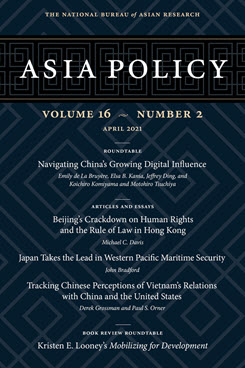Tracking Chinese Perceptions of Vietnam’s Relations with China and the United States
This article sheds light on trends in Chinese assessments of U.S.-Vietnam relations and security cooperation to discern patterns in the security dynamics between the three countries.
EXECUTIVE SUMMARY
MAIN ARGUMENT
Since the turn of the century, Chinese foreign policy experts have consistently assessed that while there will always be certain tensions in the China-Vietnam relationship, economic and geopolitical realities prevent Vietnam from aligning against China or collaborating with the U.S. to any significant extent. Although some Chinese experts began to question the durability of China-Vietnam ties following Beijing’s expansive nine-dash-line claim over much of the South China Sea in 2009 and a series of standoffs over disputed waters starting in May 2014, the general Chinese assessment that Vietnam will not work too closely with the U.S. to counter China continues to prevail.
POLICY IMPLICATIONS
- The consistency of Chinese analysts’ perceptions strongly suggests that China is unprepared for major and abrupt shifts in Vietnamese hedging in the future. Chinese elites likely view the predictability of U.S.-Vietnam relations as favorable to their government’s foreign policy and military strategy. Thus, any significant change in Hanoi’s security cooperation with Washington would surprise and rattle Beijing.
- Although Vietnam is unlikely to oppose China outright, it is also unlikely to collaborate with Beijing on security issues. This dynamic appears irreversible, barring a wholesale revamping of Chinese security policy in the South China Sea that includes recognition of and respect for Vietnam’s exclusive economic zone and territorial claims.
- China is unlikely to disrupt regional peace and stability over closer U.S.-Vietnam cooperation. Therefore, raising the U.S.-Vietnam partnership from “comprehensive” to “strategic” in Vietnamese parlance, as has been discussed in the past, would be unlikely to register much reaction from Beijing.
Derek Grossman is a Senior Defense Analyst at the RAND Corporation (United States), an Adjunct Professor at the University of Southern California, and a regular contributor to the Diplomat. He formerly served as the daily intelligence briefer to the assistant secretary of defense for Asian and Pacific security affairs at the U.S. Department of Defense.
Paul S. Orner is a PhD candidate in the Political Science and International Relations Department at the University of Southern California (United States) and an Adjunct Researcher at the RAND Corporation. He is also currently a predoctoral fellow at the George Washington University’s Institute for Security and Conflict Studies.
About Asia Policy
Asia Policy is a peer-reviewed scholarly journal presenting policy-relevant academic research on the Asia-Pacific that draws clear and concise conclusions useful to today’s policymakers. Asia Policy is published quarterly in January, April, July, and October and accepts submissions on a rolling basis. Learn more


